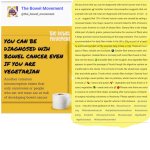Pescovegetarians have lower risks of developing colorectal cancers than vegans or meat-eaters. Studies have spanned over 20 years, so sometimes just the conclusions are written in websites such as the following from the Cleveland Clinic, which is in the US top ten cancer treatment centers.

What To Eat To Lower Your Risk of Colon Cancer
Many types of cancer aren’t preventable. But when it comes to colon cancer, your lifestyle and habits can play a huge role in helping lower your risk. A colorectal surgeon weighs in on what to eat (and what to avoid) to maintain colon health and decrease your risk.health.clevelandclinic.org
The study, published in the journal JAMA Internal Medicine, found a pesco-vegetarian diet — dominated by fruits and vegetables and including a moderate amount of fish — is associated with a 45% reduced risk for colorectal cancers compared to people whose diets include meat.
Thanks for that. Yes, I think the Loma Linda research is on 7th Day Adventists and it is extremely valuable.
Here also:
Associations of Japanese food intake with survival of stomach and colorectal cancer: A prospective patient cohort study - PMC
Dietary factors may affect the prognosis of digestive tract cancer, but evidence has been sparse. We investigated the association between pretreatment intake of 6 Japanese foods (including soy food, miso [soybean paste] soup and seaweed) and the ...
Cancer Sci. 2020 Jul; 111(7): 2558–2569.
Published online 2020 Jul 14. doi: 10.1111/cas.14459
PMCID: PMC7385343
PMID: 32412140
Associations of Japanese food intake with survival of stomach and colorectal cancer: A prospective patient cohort study
Yuko Minami,1 , 2 , 3 Seiki Kanemura, 2 Tomoyuki Oikawa, 4 Shinichi Suzuki, 4 Yasuhiro Hasegawa, 5 Yoshikazu Nishino, 6 Tsuneaki Fujiya, 5 and Koh Miura 5
Author information Article notes Copyright and License information Disclaimer
Abstract
Dietary factors may affect the prognosis of digestive tract cancer, but evidence has been sparse. We investigated the association between pretreatment intake of 6 Japanese foods (including soy food, miso [soybean paste] soup and seaweed) and the risk of death among patients with histologically confirmed major digestive tract cancers (stomach, 1931; colon, 793; rectum, 510) diagnosed during 1997‐2013 at a single institution in Japan. Pretreatment dietary intake was assessed using a food frequency questionnaire, and the patients were followed until December 2016. The Cox proportional hazards model was used to estimate hazard ratios (HR) and 95% confidence intervals (CI). Among the patients with stomach cancer, frequent intake of soy food was inversely associated with the risk of all‐cause (P trend for four frequency groups = 0.01; HR = 0.72, 95% CI: 0.50‐1.04 for highest vs lowest group) and stomach cancer (P trend = 0.03; HR = 0.63, 95% CI: 0.40‐0.99) death. A similar inverse association was also found for intake of miso soup. In contrast, frequent seaweed intake was inversely associated with the risk of all‐cause death among the patients with colon cancer (P trend = 0.03). Rectal cancer patients who had frequently consumed seaweed tended to have a lower risk of rectal cancer death (P trend = 0.02). These findings indicate that pretreatment intake of Japanese foods such as soybean products and seaweed may have favorable effects on patient survival of stomach and colorectal cancer, although this needs to be confirmed by further research.




